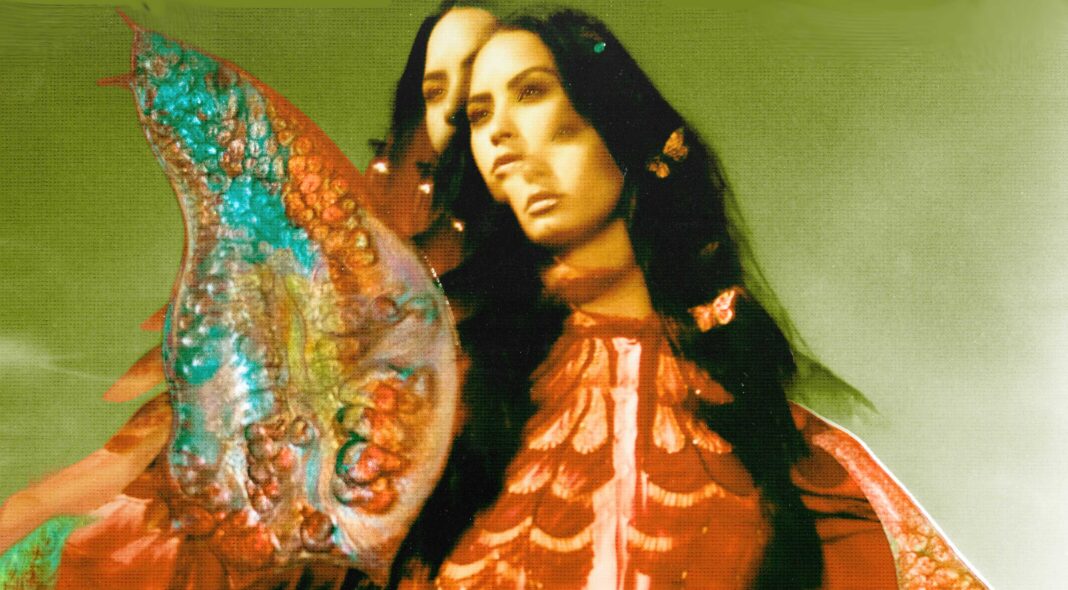Demi Lovato has always been an incredibly honest pop star. She’s shared over and over her struggles with mental health, her addictions, her relationship with her body image. So when she says at the start of her new documentary “I’m just going to say it all and if we don’t want to use it, we can take it out”, it’s not shocking that she goes onto be incredibly open about the last few years of her life and beyond. The only surprise would be if the filmmakers did leave anything on the cutting room floor, so candid and transparent is she.
The headlines of Dancing With The Devil and the main story it tells focus on Lovato’s 2018 overdose and close call with death. Filmed at various points throughout 2020, she says her motivation for making the series is to “set the record straight” about what really happened that night and she does so in unflinching detail, spelling out her path from sobriety to being addicted to crack and heroin, supported by the voices of her parents, sisters, friends and team.
The four-part YouTube docuseries uses footage from a planned documentary of her 2018 ‘Tell Me Love Me’ tour that was ultimately shelved because of the star’s overdose. In the clips, we see her putting on stunning performances, goofing around backstage and celebrating six years of sobriety in front of thousands of her fans from behind her piano. In the new interviews, though, it becomes clear that what those old clips show was a front and that, underneath, things were far from the happy picture she painted to everyone – cameras, crew, best friends, family. As a title screen sombrely tells us, it was only a month after she hit the six-year sober milestone that she relapsed and ended up hooked up to a dialysis machine in the hospital, lucky to be alive.
The series presents an eye-opening – and harrowing – lesson into the reality of addiction and the cruel nature of trying to replicate old highs. Lovato tells us that, even after overdosing and undergoing treatment in rehab, she relapsed once again. The terrifying thing that time, she says, was picking up heroin and finding “it wasn’t strong enough anymore”.
While addiction and recovery is the central focus here, it’s impossible to tell that story without exploring the other traumas Lovato has gone through. There’s her dad’s death from an overdose and the fact that her family don’t know exactly when he died because his body wasn’t found for over a week. She discusses her struggles with eating disorders, her 2020 engagement that lasted for only two months and her experiences of sexual assault. On the latter, she explains she was raped on the night she OD’ed and when she was 15 years old, working on the Disney film Camp Rock.
When she talks about those alleged rapes, she is largely weary. Her stories might be shocking to the wider world, but this is something she has lived with for a long time. “My #MeToo story is me telling somebody that someone did this to me and they never got in trouble for it,” she says of losing her virginity in a rape. “They never got taken out of the movie they were in. But I’ve just kept it quiet because I’ve always had something to say, and I’m tired of opening my mouth.” She looks straight into the camera, stony-faced, and adds wryly: “So there’s the tea.”
It’s incredibly powerful – a representation of what it can feel like to be a woman in this world that couldn’t be more timely. The fact that Lovato says she didn’t come forward at first about her assault on the night she nearly died because she thought people wouldn’t believe her is nothing new, but that’s precisely why it adds to the emotion of an already incredibly moving documentary. If even a woman with the power of fame and celebrity is scared of people thinking she’s lying, what hope do the rest of us have?
One concern going into Dancing With The Devil is the potential for the sensationalisation and exploitation of a young woman’s trauma. But director Michael D. Ratner hands everything Lovato gives him sensitively, allowing her to take the lead in her story and guide us down its various paths. By the end, we find her happier, healthier and looking forward to getting back to what she loves the most – music. “I’m not living my life for other people, or their headlines, or their Twitter comments,” she says defiantly at one point. With a new album on the way, this docuseries lets the singer close this distressing chapter of her life and do what the upcoming record’s title suggests and start over.






